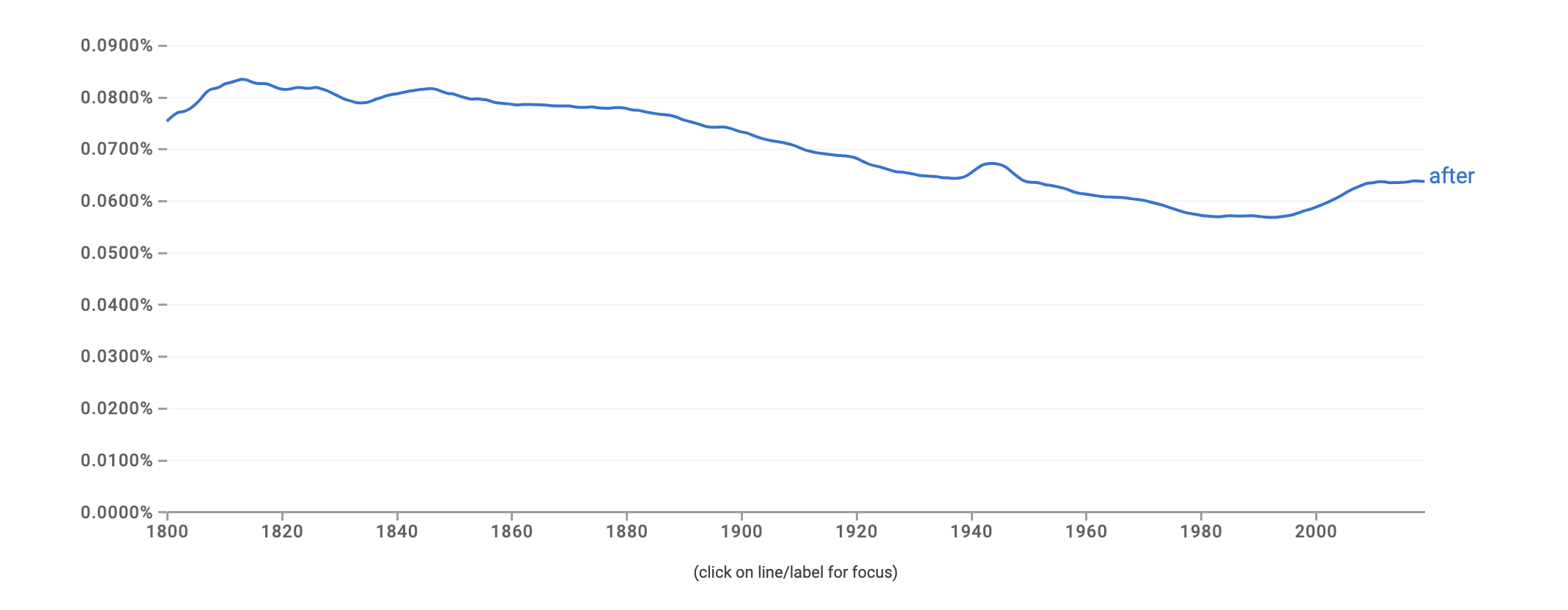- "After" is a preposition, conjunction, adverb and adjective primarily used to indicate temporal or sequential relationships between events or actions, showcasing its versatility in expressing time, conjunction, and conditional relationships in English sentences.
Preposition (Temporal Usage): She went to the market after the sun had set.
Conjunction (Conjunctive Usage): John finished his homework, and after that, he went to bed.
Conjunction (Concessive Usage): After all his efforts, he couldn't solve the puzzle.
Subordinating Conjunction (Subordinate Clause): After the rain stopped, they decided to go for a walk.
Adverb (Temporal Usage): The cat came home shortly after, looking drenched from the rain.
Adjective (Rare Usage): The after effects of the storm were visible in the flooded streets.
Conditional Conjunction (Conditional Usage): After you finish your chores, you can have some free time.

When to use the word "after"
The word "after" is a versatile term in the English language and can be used in various contexts. Here are some common situations when to use the word "after":
Temporal Relationships:
- Use "after" to denote the chronological order of events or actions.
Example: She will call you after the meeting.
Sequence or Order:
- Employ "after" to indicate the order of actions or occurrences.
Example: We will have dessert after dinner.
Conjunction:
- Use "after" as a conjunction to connect two related clauses or ideas.
Example: She studied for hours, and after that, she aced the exam.
Subordinate Clauses:
- Introduce subordinate clauses with "after" to provide additional temporal information.
Example: After the sun went down, the temperature dropped significantly.
Conditional Statements:
- Employ "after" in conditional contexts to express a condition that must be met for another event to occur.
Example: You can play video games after you finish your homework.
Concession:
- Use "after all" to introduce a statement that contrasts with or concedes to a previous point.
Example: You deserve a break after all your hard work.
Adverbial Use:
- Use "after" as an adverb to describe the timing or sequence of an action.
Example: He arrived shortly after the movie had started.
Adjective:
- In rarer instances, "after" can be used as an adjective or noun, indicating the following part of an event or the consequences.
Example (Adjective): The after effects of the storm were evident.
Examples from the web
"After all, you just go to an emergency room." - The New York Times
"But we'll know much more after the other side goes because arguments are often one-sided like this half way through." - The New York Times
How do you spell "after"
A-F-T-E-R. "After" is spelled A-F-T-E-R. It is a five-letter word commonly used as a preposition or conjunction, indicating temporal relationships, sequence, or conditions. Understanding its spelling is fundamental for clear and effective communication in the English language.
How to pronounce "after"
In American English, "after" is pronounced af·tr
In British English, "after" is pronounced aaf·tuh.
This is just the standard pronunciation, and there may be slight variations depending on regional accents and individual speech patterns.
The usage of "after" over time
The word "after" has been used consistently over time.

Synonyms for "after"
Following:
- Example: Following the instructions, she completed the task.
Subsequent to:
- Example: Subsequent to the meeting, we will discuss the project.
Later:
- Example: I'll see you later, after I finish my work.
Behind:
- Example: The car drove behind us after we left the parking lot.
Next:
- Example: The next step is to submit the application after filling it out.
Beyond:
- Example: Success awaits just beyond the challenges we face.
In the wake of:
- Example: In the wake of the announcement, there was widespread excitement.
Post:
- Example: The event post dinner was a delightful surprise.
Pursuing:
- Example: Pursuing your dreams comes after careful planning and hard work.
Later on:
- Example: We can discuss this matter later on, after the main presentation.
Summary
The word "after" emerges as a linguistic powerhouse, seamlessly adapting across parts of speech. Its role as a preposition, conjunction, and more unveils a rich tapestry of temporal relationships, conjunctive functions, and conditional nuances, enriching our language and facilitating nuanced communication.

Want to sound like a native speaker?
Engram’s AI-powered grammar checker makes your English sound like a native speaker’s, suggesting natural English expressions on top of fixing grammar, spelling, punctuation, word order, and vocabulary.

References:














